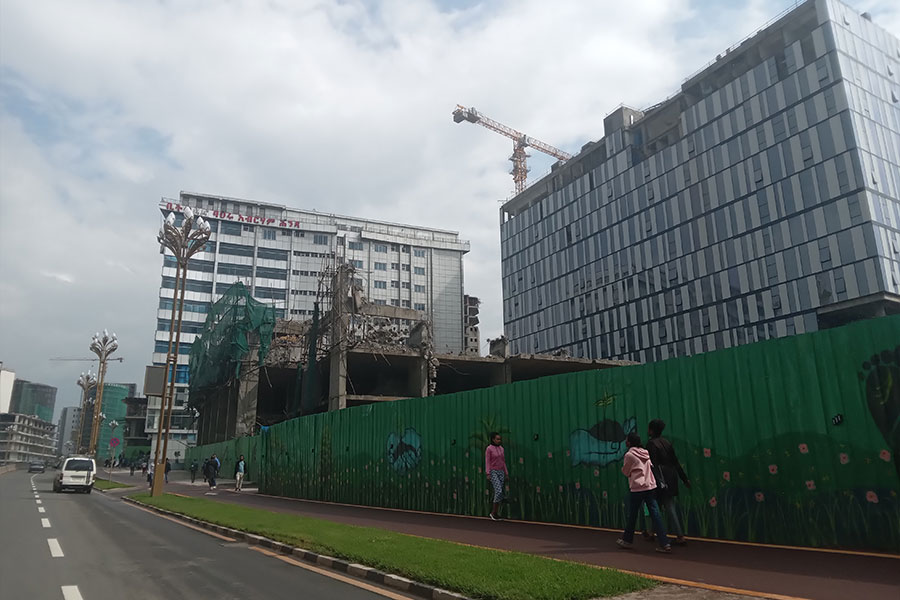
Fortune News | Jan 03,2025
Abel Yeshitila, a real estate developer with a 12-year track record, finds himself unable to sell homes in his latest venture. Despite slashing the asking price for upscale apartments in the Bole District Welo Sefer area from 194,000 Br to 154,000 Br a square metre, Abel laments the drastic drop in demand to an all-time low.
"Buyers are nowhere to be found," he told Fortune.
The towering 17-storey Bella Apartments, with an estimated cost of 485 million Br, is now directly funded by the developers. Abel, a significant shareholder, has previously overseen successful apartment sales in four projects. However, he attributes the current market stagnation to political instability, discouraged diaspora buyers and a scarcity of loans for locals navigating a sluggish economy. With only four out of 24 semi-finished apartments sold, Abel's apprehension deepens as he contemplates the fate of a dreary market.
"Real estate is highly sensitive to credit access," he said.
Heavily dependent on continuous credit flow, the real estate sector faces difficulties following the National Bank of Ethiopia's (NBE) shift towards inflation-targeting monetary policies, five months ago. While successful in reducing inflation rates by two percent, the constricted credit supply hampers funds flowing into the real estate sector, leading to declining property prices, diminished demand and developers struggling to complete projects.
The gloomy market extends its grip to homeowners like Ameleworq Tsegaye, who has been unsuccessful in finding a buyer for her 72sqm three-storey home in the Haile Garment area. With an asking price of 35 million Br a year ago, Ameleworq remained steadfast in her belief that the property is at a prime location, although larger properties at a similar price point were available. She is now open to settling for less to alleviate other debts.
"I'd be open to negotiation if there were sufficient offers," she said.
The burdensome combination of fluctuating property valuations, heightened taxes and the ongoing credit squeeze has cast uncertainty over the once-thriving real estate market. Land holdings initially valued at 70 million Br last year find themselves in a state of neglect as they struggle to garner interest, with a substantial price reduction of 14pc in the Lideta District.
Minase Hailu, a lawyer with a decade of experience handling property disputes, notes a peculiar trend; price estimations decrease by millions when the property becomes available post-court ruling. Minase recalled an optimistic overtone over property prices when land auctions in the capital returned last year, attracting historic bids of 695,000 Br a square metre. Expectations of high returns and quick sales, however, are failing to materialise.
"Demand is surprisingly low," he said, "Even at lower prices."
This turn of events has sent ripples through the sector, prompting industry insiders to shed light on a concerning trend. The sector, which has predominantly focused on constructing high-end apartments for a select group of buyers, now faces a difficult reckoning. Traditional reliance on catering to an elite clientele is now met with resistance, signalling a potential shift in buyer preferences.
Archi real estate expo at Millennium Hall
While costs for construction of a square metre waver between 40,000 Br to 60,000 Br, selling prices have tripled with a significant down payment of up to 30pc. Prices for homes and apartments have dropped by nearly 15pc over the past six months. Alongside the monetary pinch, the political instability in certain parts of the country has pushed off diaspora buyers.
"It's now a buyer's market," said Enyew Tadesse, real estate consultant and managing partner of One Window Properties. He explains that the housing market in Ethiopia has been historically composed of businessmen looking to stave off inflationary headwinds by saving wealth through real estate and buyers, especially for premium apartments looking to do the same.
"The credit squeeze has impacted both," Enyew told Fortune.
Enyew has participated in several real estate deals over the past few months where buyers bargain for significantly lower prices by dangling the prospect of immediate payments in the liquidity-strapped market. He believes part of the cause for the mismatch between housing demand and supply to have been an overly inflated market muddled by avaricious developers raking 300pc margins and illicit financial flows being cleansed through assets.
Industry insiders believe prices for real estate have gotten healthier over the past year rather than falling.
Remzi Hassen, marketing manager of the decade-old luxury apartment company Afrosweeden Realestate, said his company with five apartment projects across the capital, two of which have sold out, has historically catered to customers looking for high-end apartments. He said narrowing profit margin and increasing quality have helped the company stay afloat.
"Targeted customer base has helped us remain unscathed by the price lull," he said.
However, others in the industry assert the crisis extends beyond the credit constraints.
For Brook Shimeles, the deputy general manager of development at Flintstone Homes, recent changes in property valuations and the imposition of property taxes have proven to be the final nail in the coffin for the real estate sector. Coupled with the prevailing scarcity of credit, these factors have contributed to a relentless market slowdown that has been progressively intensifying since the previous year.
"The sector has come to a standstill," he told Fortune.
Flintstone had been in the public consciousness for the past 12 years, handing over a residential village, which consists of 40 villas, 60 townhouses and 467 condominium apartments. The developer, offering homes with a 300,000 Br down payment, is currently undertaking the construction of 3,000 homes. However, according to Brook, the intermittent suspension of services by land-related bureaus adds an element of unpredictability to the property market, dissuading potential buyers.
"It discourages investors from injecting capital," he said.
The recent suspension of property transfer services at the Addis Abeba Land Development Administration Bureau, announced three weeks ago, further compounds the issue. Brook notes that the anticipation of substantial returns from real estate investments diminishes in the face of elevated levies on immovable property transfers and a simultaneous contraction in demand.
"Expecting larger tax revenues by simply increasing rates is a counterproductive strategy," he said.
Around 300 real estate developers, predominantly selling semi-finished properties, are experiencing a substantial decline in property value. Average apartment prices have dropped from last year's highs of over 120,000 Br a square metre to around 75,000 Br, with some realtors offering prices as low as 58,000 Br a square metre.
In the Lemi Kura District around Ayat area, broker Kibrom Bogale has experienced a stagnant market, facilitating only a single property sale in the past six months. Frustrated by the perceived lifelessness of the market, Kibrom, in his late 20s, reflects on the difficulties posed by an abundance of sellers and a scarcity of buyers.
"There are too many sellers and not enough buyers," he lamented.
The absence of standards and well-defined real estate laws is identified as a cause of disputes and fraud. Berket Habtu, a real estate agent with a decade of experience, notes that a decrease in prices would lead to increased demand if there were sufficient cash flow and economic activity. However, he emphasises that buying property for quick profit resale is no longer viable.
Bereket points to the absence of a real estate law defining when a property is considered semi-finished, which contributed to the past inflated prices supported by excess credit.
"Most buyers don't plan to live in the apartments they purchase," he said.
Bereket highlights that buyers with liquidity and capital tend to opt for high-end properties for resale, attracting quick payments and benefiting developers. He observed that speculations around currency devaluation also have a say in property markets. He stresses the urgent need for hundreds of thousands of new homes annually, targeting an unaddressed majority in the housing market.
The Center for Affordable Housing Finance in Africa's 2023 annual report estimates that meeting demand for housing in Ethiopia would require close to 486,000 new urban homes each year. Ethiopia has managed to complete around 50,000 homes during years of the highest levels of economic growth over the past two decades.
Due to the long payback period and risk associated with real estate loans during liquidity squeezes, both the demand and supply sides of the sector face financing challenges. Real estate developers are halting new projects and resorting to selling properties with a minimal 10pc down payment in a fiercely competitive, credit-tight market.
A vice president from one of the top eight commercial banks spoke anonymously to Fortune, explaining that even without a credit growth cap, there is insufficient liquidity to support the real estate sector. He said quick returns and foreign exchange capabilities are prioritised, making it equivalent to a halt in new loans. The industry expert attributes the liquidity shortage in banks to consecutive mandatory bond purchases by the government, including a 20pc treasury bond introduced in October 2022 and a one percent mandatory purchase from the Development Bank of Ethiopia (DBE).
"Interbank transfers are sharply declining as a result," he told Fortune.
The banker recommends that homebuyers adjust expectations, shifting from the typical 70pc loan provision to a more realistic 30pc in the current financial landscape.
Officials plan to establish a base year for assessments during periods without extraordinary market fluctuations. The Ministry of Urban & Infrastructure has completed the drafting of a national standard as part of an effort to standardise property valuations nationwide.
Adane Egzie, head of the Real Property, Market & Valuation Permit Division at the Ministry, said the newly proposed standards aim to address this issue by being sensitive to price variations. According to Adane, establishing reliable metrics for property valuation will enhance the accuracy of valuations in sales agreements and rental transactions.
"The absence of standards has resulted in mispricing," he told Fortune.
Financing remains crucial. The importance of updating banking policies to incorporate mortgage banks is recommended by experts, citing examples from developed countries where consumers can buy cars through long-term leases.
With a mortgage bank directive in limbo, several institutions have come and gone in the last five decades. Goh Mortgage Bank has been around for two years while a recent pickup surfaced with Ovid Mortgage Bank, which announced its entry into the market last year.
Mulugeta Asmare, former president of Goh Mortgage Bank, stressed the close relationship between credit institutions and private real estate developers. He notes that developers often lack internal capital for large projects and buyers struggle with insufficient liquidity for property purchases. According to Mulugeta, the recent slowdown is due to an artificially inflated market from excessive money circulation.
"As soon as the credit squeeze ends," he said, "Prices will most likely rebound."
To address the housing shortage, Mulugeta advocates revisiting land policies, coming up with mortgage banking laws, and introducing a national housing fund. He proposes a proclamation where a small percentage of monthly salaries funds affordable housing projects, providing long-term relief.
PUBLISHED ON
Feb 24,2024 [ VOL
24 , NO
1243]

Fortune News | Jan 03,2025

Life Matters | May 27,2023

Commentaries | May 24,2025

Agenda | May 23,2020

In-Picture | Sep 29,2024

Life Matters | Aug 18,2024

Advertorials | Nov 15,2023

Radar | Jan 09,2024

Fortune News | Jun 29,2025

Fortune News | Aug 12,2023

Dec 22 , 2024 . By TIZITA SHEWAFERAW
Charged with transforming colossal state-owned enterprises into modern and competitiv...

Aug 18 , 2024 . By AKSAH ITALO
Although predictable Yonas Zerihun's job in the ride-hailing service is not immune to...

Jul 28 , 2024 . By TIZITA SHEWAFERAW
Unhabitual, perhaps too many, Samuel Gebreyohannes, 38, used to occasionally enjoy a couple of beers at breakfast. However, he recently swit...

Jul 13 , 2024 . By AKSAH ITALO
Investors who rely on tractors, trucks, and field vehicles for commuting, transporting commodities, and f...

Jun 28 , 2025
Meseret Damtie, the assertive auditor general, has never been shy about naming names...

Jun 21 , 2025
A well-worn adage says, “Budget is not destiny, but it is direction.” Examining t...

Jun 14 , 2025
Yet again, the Horn of Africa is bracing for trouble. A region already frayed by wars...

Jun 7 , 2025
Few promises shine brighter in Addis Abeba than the pledge of a roof for every family...